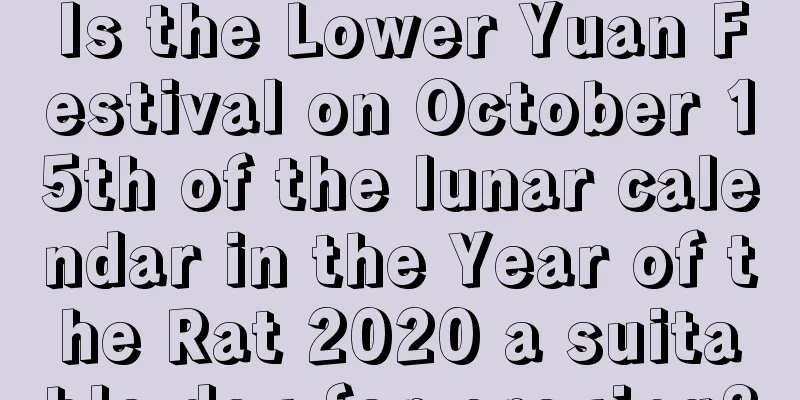What are the customs of Jingzhe? Is it possible to “beat the villain” during Jingzhe to get rid of bad luck?

Introduction: Jingzhe is one of the 24 solar terms in my country. There are many traditional customs and etiquette on Jingzhe Day. Did you know that there is a custom of "beating villains" on Jingzhe Day? What other customs are there for Jingzhe? Let’s take a look at it together below! The second month of the lunar calendar tells the stories of every day in February, bringing you the do's and don'ts of every day in February, as well as the directions of the God of Wealth and the God of Happiness, etc., making you full of expectations.Waking of Insects Customs: Beating the villain to drive away bad luckJingzhe symbolizes the beginning of February. It is like a thunderclap out of the blue, awakening all the hibernating snakes, insects, rats and ants. The reptiles and ants in the house will respond and start looking for food everywhere. Therefore, in ancient times, on the day of Jingzhe, people would hold fragrant incense and mugwort and fumigate the four corners of their homes to use the fragrance to drive away snakes, insects, mosquitoes, rats and musty smells. Over time, this gradually evolved into a habit of those who were unhappy slapping their opponents and driving away bad luck, which is the predecessor of "beating the villain".Therefore, an interesting scene would appear on the day of Jingzhe every year: a woman would hit a paper doll with a wooden slipper while chanting a spell to beat the little man: "I'll beat your head until you are breathless and trembling, and I'll beat you until you vomit even your relatives." "Qian Jin Yue Ling" said: "On the day of Jingzhe, take lime and sprinkle it outside the door threshold to kill insects and ants." Lime has the effect of killing insects. On the day of Jingzhe, it is sprinkled outside the door threshold. It is believed that insects and ants will not dare to come to the house for a year. This is the same as shaking clothes when hearing thunder. Both are to give insects a warning when they come out of hibernation, in the hope that pests will not come to harass you. Waking of Insects Customs: Expressing Inner ResentmentMany people have deified "beating villains", but in fact it is purely a folk custom. The purpose of beating villains is to drive away the villains and plague gods around you and vent your inner dissatisfaction by slapping paper dolls representing your enemies. Most people beat villains with the general purpose of praying for good luck in the new year and no villains to cause trouble. The targets of "beating" are mainly mistresses and "golden fingers" at work. The purpose of beating villains is to make them give up and vent their inner resentment.Jingzhe customs: offering sacrifice to the white tiger to resolve disputesAccording to Chinese folklore, the White Tiger is the god of gossip and disputes. Every year, it comes out on this day to hunt for food and bite people. If you offend this, you will be bullied by evil people throughout the year, hindering your future development and causing all kinds of misfortune. In order to protect themselves, people offered sacrifices to the White Tiger on the day of Jingzhe. The so-called white tiger sacrifice refers to the worship of a white tiger drawn on paper. The paper tiger is usually yellow with black stripes, and has a pair of fangs painted on the corners of its mouth. During worship, the paper tiger is fed with fat pig blood so that after it is full it will not speak ill of others. Then raw pork is smeared on the mouth of the paper tiger so that it is filled with oil and water and it cannot open its mouth to speak ill of others.Jingzhe customs: eating pears during JingzheThere is a folk custom of "eating pears during the Waking of Insects". There is no trace as to when the custom of eating pears during the Waking of Insects season originated, but the people of Qi County have such a story that has been passed down from generation to generation. Legend has it that the Qu family, a well-known Shanxi merchant family, was descended from Qu Ji, a native of Changzi County, Shangdang. In the early years of Hongwu in the Ming Dynasty, he brought his two sons, Xin and Yi, and traded Shangdang's Lu hemp and pears for Qi County's coarse cloth and red dates. He traveled back and forth between the two places to make a profit. Over time, he saved some money and settled down in Qi County.During the reign of Emperor Yongzheng, the fourteenth generation Qu Baichuan left for the west on the day of Jingzhe. His father took out a pear and asked him to eat it, saying that his ancestors started a business by selling pears, experienced hardships, and settled in Qi County. Today is the Jingzhe day for you to leave for the west, and eating pears means that you will not forget your ancestors and work hard to start a business to bring honor to your family. Qu Baichuan went to the west to do business and became rich, and named the business he opened "Changyuanhou". Later, those who went west also followed suit and ate pears, mostly with the intention of "leaving home to start a business." Even later, pears were eaten on the Waking of Insects Day, with the idea of "working hard to honor ancestors." Summary: The above article is a detailed analysis of the customs of Jingzhe. Jingzhe also has customs such as "beating villains". After reading it, do you have a different understanding of the Jingzhe solar term? You have finished reading this article. For more exciting content, please check out the special topic of the second month of the lunar calendar! |
Recommend
Is it appropriate to pray on the fifth day of the sixth lunar month in 2020? Is the hexagram good?
The summer period is divided into Mengxia, Zhongxi...
Is it a good idea to propose marriage on April 20th of the lunar calendar in 2022? Can I propose marriage?
The things suitable for doing on each day of the l...
How about signing on August 30, 2020? Check the auspicious time on October 16
Introduction: It is necessary to choose an auspici...
Is it a good idea to open the new store on December 23rd, 2017?
2018 has just begun and the Year of the Rooster i...
When is the Spring Equinox in 2022? Is it an auspicious day? What about the lunar calendar?
The Spring Equinox is the fourth solar term in spr...
What is the fate of those born on February 2, the day when the dragon raises its head? Is their fortune good or bad?
Introduction: Although children cannot choose the ...
Introduction to the zodiac signs of children born on the tenth day of the seventh lunar month in 2021. Is it a Leo?
Speaking of constellations, I believe everyone is ...
Analysis of the first day of April in the lunar calendar in 2021. Can you travel on that day?
There are certain considerations and rules when ch...
When is Cold Clothes Festival in 2021? What needs to be done on the day?
The Cold Clothes Festival is a traditional festiva...
Is the ninth day of the eighth lunar month in 2019 an auspicious day for a haircut?
In the eighth month of the lunar calendar, the swe...
What is the fate of those born on October 1, National Day, who are of the Tiger sign?
What is the fate of those born on October 1, Natio...
What are the traditions about when to get a haircut on February 2, the day when the dragon raises its head? What is the meaning of getting a haircut on this day?
The Dragon Raising its Head is one of my country&#...
What are the auspicious and inauspicious days and times on the tenth day of the sixth lunar month in 2017?
Introduction: Our country is a traditional cultura...
Can I go on a date on the day of the Beginning of Autumn in 2020? How many days are left until the Beginning of Autumn in 2020?
Introduction: The day of the Beginning of Autumn c...
Is the fifth day of the twelfth lunar month in 2017 a suitable day for opening a business?
The twelfth month of the lunar calendar is a mont...









